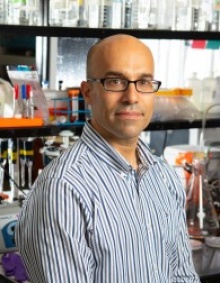
Omer Gokcumen, associate professor, Department of Biological Sciences
Omer Gokcumen featured on WNYC’s “Radiolab”
Omer Gokcumen, associate professor in the Department of Biological Sciences, was recently featured on WNYC’s Radiolab in a segment titled “Neanderthal’s Revenge.”
The episode, hosted by Latif Nasser, follows Nasser’s personal medical journey and uncovers what he calls “the secret genetic story of how we became human.” While investigating the origins of Crohn’s disease, Nasser came across a research article by Gokcumen, sparking a deep dive into evolutionary genomics and the legacy of Neanderthal DNA in modern humans.
🎧 Listen to the full podcast: Neanderthal’s Revenge on Radiolab
Excerpt of Gokcumen's segment (starts at 18-minutes into program):
LATIF: Did we get Crohn's disease from Neanderthals?
OMER GOKCUMEN: No?
LATIF: No.
LATIF: The Neanderthals probably aren't to blame.
OMER GOKCUMEN: It seems to me that Crohn's disease is actually older than Neanderthals, older than humans.
LATIF: That Crohn's disease, or at least this genetic variation predisposing you to it developed all the way back in Homo erectus.
OMER GOKCUMEN: The homo erectus group in Africa before, you know, they were spread across the world.
LULU: Oh! Wait, so this kind of contradicts what the other scientists found.
LATIF: Well, not exactly. It turns out for a disease as complicated as Crohn's, there are actually multiple parts of the genome that contribute to it. Some of those did come with sex with Neanderthals, but a lot also came from before we—or they—ever existed. And for that reason, Omer says ...
OMER GOKCUMEN: It's more accurate to say that we share Crohn's disease with Neanderthals. Part of our legacy, in a way.
About Radiolab (from their website): We ask deep questions and use investigative journalism to get the answers. A given episode might whirl you through science, legal history, and into the home of someone halfway across the world. The show is known for innovative sound design, smashing information into music. It is hosted by Lulu Miller and Latif Nasser.
Radiolab is supported in part by Science Sandbox a Simons Foundation initiative dedicated to engaging everyone with the process of science. Additional leadership support is provided by the Gordon and Betty Moore Foundation, fostering path-breaking scientific discover; the Shanahan Family Charitable Foundation; The Smart Family Fund; and the John Templeton Foundation.